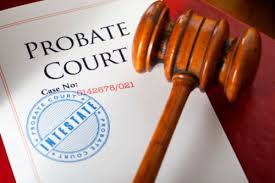|
We can’t always predict if an emergency or misfortune may strike, but that doesn’t mean we shouldn’t be prepared. In the event of a natural disaster or some family emergency, would you know what to grab and be able to grab it in a matter of a few minutes, or even seconds? Having all your documents and important information organized in an emergency binder, along with your Estate Planning Portfolio, in an accessible location may save a lot of time and avoid a lot of headaches and frustration later on.
While the above list is not exhaustive of what you may need in an emergency binder, with a simple search on the Internet, you can find plenty of emergency document checklists that would cater to your circumstances. Place your Emergency Binder in a safe but accessible location. Putting it in a fireproof safe may be secure, but consider the amount of time to open it or remembering the access code. Organizing the vital documents will give you peace of mind and protect your family in a time of crisis.
0 Comments
The rapidly evolving coronavirus (COVID-19) pandemic is creating many challenges worldwide and has raised many concerns in regards to estate planning.
In our last post, we discussed when and how often we should review our current estate plan. Now more than ever we need to make sure we and our loved ones are legally prepared and protected in case the unthinkable happens. In response to the “stay at home” order from California Governor Gavin Newsom on March 19, 2020, many of us are home, and now would be the time to review your current estate planning documents or get started the process of establishing your estate plan to make sure that you and your loved ones are well protected. Reviewing your documents would include making sure your wishes are set in your Trust, Wills, Powers of Attorneys, Guardianships for your minor children, beneficiary designations on your financial and retirement accounts, life insurance, annuities, etc. Here are some questions to consider:
It's the start of a new year, and I know for some people they have been putting off doing a Will or Trust, and their 2020 New Year's Resolution is to get it done! But for others, they already have their estate planning in place; they think it's all done and over with and don't need to revisit them ever.
However, in order for your estate planning documents to properly achieve the three objectives of an estate plan (1) distribution to the proper parties, 2) proper management until such distribution and preservation and 3) protection from probate fees and estate taxes) you should periodically review and update as appropriate or necessary. We recommend that you review your entire estate plan a minimum of every 3 years. If any of the events below occur, it’s a good idea to review them even sooner:
Should you require our assistance in reviewing and updating your estate plan, please give us a call. You may have heard that it’s best to avoid probate because it's expensive and time-consuming. If you don’t have a proper estate plan in place, such as having a living trust, your estate may end up in probate. It’s important to avoid probate to make sure your loved ones are provided for and not have to worry about their inheritance being tied up in court.
Probate in California is a court supervised process to wind up a person's legal and financial affairs after death and is usually overseen by probate lawyers. In general, the greater the value of your probate assets, the higher probate will cost. But how much does it cost to go through the probate process? First of all, both the attorney and the personal representative (called either the executor or administrator) are entitled to fees from your estate. The fees are determined by state law and based on a percentage of the gross estate value. (There are no deductions on loans or set-offs). Then, there are other fees such as court costs, publication costs, accounting, appraisal fees, bond fees and other expenses. A typical estate may incur $1,000 to $3,000 in court costs alone and other mandated fees. After adding all the fees and costs, probate can cost anywhere from 3% to 8% of your assets that could have been included in your distribution to your beneficiaries. How much do the attorney and the personal representative get paid? In California, the statutory fees for the attorneys and personal representative are broken down as follows:
Example #1: If your only asset in your estate is a $500,000 house, the statutory fee would be $13,000 based on the full $500,000: 4% of the first $100,000 = $4,000 3% of the next $100,000 = $3,000 2% of the remaining $300,000 = $6,000 TOTAL: $13,000 This total amount doubles to $26,000 if the estate has to pay both the attorney and the personal representative. Example #2: If the estate was worth $1 million, the statutory fee would be $23,000, doubled to $46,000(!) in total fees for the attorney and the personal representative: 4% of the first $100,000 = $4,000 3% of the next $100,000 = $3,000 2% of the remaining $300,000 = $16,000 TOTAL: $23,000 (or $46,000 for both the attorney and personal representative) Sometimes, the personal representative may waive his or her fees if it's usually a family member, but he or she may change their mind after they realize how much work and time is involved. And the fees are based on the gross value of the estate. So if there is a mortgage and the heir wishes to sell the property, the inheritance would be even less. On the other hand, a properly created and maintained living trust avoids probate. Your successor trustee winds up your financial matters, pay your last bills, and distributes your property according to your trust provisions without going to court and having to pay a significant amount in fees to the attorney and personal representative. The days are long, but the years are short. I know soon enough my children will be going off to college and although it’s something to look forward to, I don’t want it to happen just yet. Do you have a child going off to college already?
Having some estate planning documents in place before they head off to college is especially important even if you don’t think they need it. You may think they’re too young or don’t really have any significant assets. However, when a child turns 18 years old, they are legally their own person. Parents of an adult child will no longer be able to control the health care decisions of their child or be able to manage their child’s financial affairs. For example, if your child is going to an out-of-state college and is involved in an accident that leaves your child unable to make medical decisions, without a health care directive, the doctor may not release any information on your child’s medical condition or make any decisions unless there is a court order. Or if your child is studying abroad in another country and needs immediate access to funds, you may need a power of attorney for your child to be able to talk to the financial institutions and help get money to your child overseas. Make sure to discuss what documents are needed for your children who are turning 18 or recently turned 18 years old. As we reflect during this time of Thanksgiving, we are grateful for all of our clients, partners, friends and family for everything they do to support us each and every year.
We hope you have a wonderful and happy Thanksgiving with your family and loved ones!  One of the toughest decisions that I find people have is choosing who to be a guardian for their children. And because they can’t decide who to be the guardian for their kids, they put off naming someone or even put off doing their whole estate plan. A guardian is the person or people (if you name a couple) responsible for your kids’ physical, emotional and spiritual well-being. If you name a couple and one of the spouses pass away, ask yourself whether the surviving guardian spouse can care for your child alone or would you want to go to your next choice for a guardian. When nominating a guardian for your child, consider:
If this is still difficult for you, keep in mind that the other alternative is a Judge making the decision for you and who doesn't know you and your circumstances. It's that time of the year again! With the tax filing deadline around the corner, and though filing your taxes is not exactly thrilling, it needs to be done. It can be a bit overwhelming to have to dig through your files and gather all your paperwork to file taxes. But after taking this first step, the rest of the process should be easier and less stressful. Here’s a checklist of what you will need to gather before your tax appointment: 1) Your Social Security number, your spouse’s and/or dependents’ Social Security numbers 2) Last year’s tax return 3) All W-2 and/or 1099-MISC forms including any contractor’s income 4) Self-employed bookkeeping records 5) Schedule K-1s 6) Bank saving interest and dividend statement from credit unions, stockbrokers, etc. 7) Unemployment compensation report 8) Social Security benefits report 9) Gambling winning or lottery winning statement 10) State Income tax refund from last year 11) Withdrawal statement of your 401K, IRA, Pension and Annuity, etc. 12) IRA contribution for last year 13) Education expenses for your children and yourself and student loan interest 14) Health and dental insurance / Obama Care premium payment and associated expenses 15) House mortgage interest records 16) House property tax records 17) Auto registration fees 18) Childcare expenses, care provider's name, SSN or Tax ID-FEIN, and address 19) Business expenses, business travel, rental property, stock, bond, real estate, job related moving expenses, etc. 20) Charitable donations made throughout the year 21) 1099-C forms, if you canceled any debt during the year 22) Record of alimony received 23) Energy-efficient home improvement records and receipts Many people have asked me what the difference is between a WILL and a LIVING TRUST, and if they really need both or just one or the other. Or they state that their estate is fairly simple – just a house that I want to leave to my kids equally – and they think that a simple will is sufficient.
However, both a living trust and a will serve different purposes and will have difference outcomes, but both can also work together for a complete estate plan. Both a will and a revocable living trust allow you to name beneficiaries and allow you to state how you want your assets distributed. But there are many differences between the two estate planning devices. Listed below are some of the important differences between a Will and a Living Trust. #1: A Will goes into effect only after you pass away. A Living Trust takes effect as soon as you create it and is especially important if you become incapacitated. #2: A Will directs who will receive your property at your death. A Trust can be used to begin distributing property before death, at death or afterwards. #3: Most importantly, with a Will, any assets you own, will go through PROBATE (provided that it is worth $150,000) and the proceedings and documents are public record. The court will oversee the administration of the Will and ensure that it is valid and the property gets distributed the way the decedent wanted. A Trust passes outside of probate, which is private, saves time and money. #4: A Will allows you to name a guardian for your children and specify funeral arrangements, while a Trust does not. #5: A Trust can be used to plan for disability or to provide savings on taxes. #6: With a Will, any assets in your name will be distributed. With a Trust, only assets that have been transferred to the Trust will be distributed. Your trusted estate planning attorney can tell you how best to use a Will and Trust in your estate plan. An all too common scenario may look something like this:
A woman at the end stage of cancer suffered a stroke. Her brother, the only surviving relative, is overseas and can’t be reached. She did not have any health care directives to describe her healthcare wishes and designate someone who can make decisions for her. Important and difficult decisions regarding her care, such as life-sustaining treatment, were left to the doctors and nurses who don’t know her or even met her before. In these difficult moments, a proper health care directive would have helped the doctors and any loved ones in making the medical decisions necessary to care for her. An advanced health care directive is a document that explains the healthcare you desire in case of a serious injury or illness or incapacity. It can clarify such issues as whether you want to be resuscitated if you become terminally ill or permanently unconscious or whether you want home hospice care instead of care at the hospital. It’s not only for the end-of-life care, but the document may be most helpful if you were temporarily incapacitated and there’s a chance for recovery. At a minimum, you can name an agent (usually your spouse is the initial agent) who will speak and provide consent for medical decisions, and/or releases with hospitals and doctors on your behalf. Once you determine who your trusted agent is, talk to him or her about how you want your care to go. That way, it’s clear and your loved ones aren’t left arguing with one another about your care. It may be hard to get the conversation going, but once you get them started, it can be a relief and empowering. |
About the AuthorChristine Chung, Esq. Archives
March 2020
Categories
All
|
|
Home | About Us | Attorneys | Virtual Services | Practice Areas | FAQs | Contact Us
© 2018 Law Offices of Christine Chung. All rights reserved. Disclaimer/Privacy Notice |








 RSS Feed
RSS Feed

